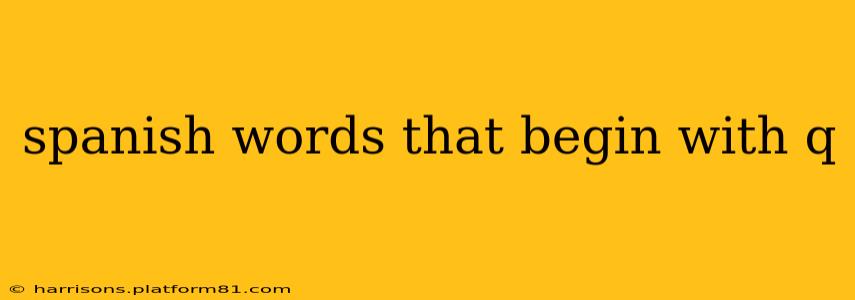The letter Q in Spanish is always followed by a U, and often by an E. This unique combination results in a relatively small number of words starting with Q compared to other letters. However, these words are often quite common and useful in everyday Spanish. This guide will explore these words, delving into their meanings, usage, and even some related vocabulary to expand your Spanish knowledge.
What are some common Spanish words that start with Q?
This is a fundamental question when exploring Spanish vocabulary. The most common words beginning with Q are those derived from Latin or have a connection to Latin roots. Some of the most frequently encountered include:
-
Qué: This is arguably the most common word starting with Q in Spanish. It translates to "what" in English and is used in various contexts, such as questions ("¿Qué hora es?" - What time is it?), exclamations ("¡Qué hermoso!" - How beautiful!), and indirect statements ("No sé qué hacer" - I don't know what to do).
-
Querer: Meaning "to want" or "to love," this verb is incredibly versatile and widely used. Its conjugations form the basis of many common phrases and expressions. For example, "Quiero ir al cine" (I want to go to the cinema) or "Te quiero mucho" (I love you very much).
-
Quién: Meaning "who" or "whom," this interrogative pronoun is crucial for formulating questions about people. "Quién llamó?" (Who called?) is a simple example. It also has variations such as "quiénes" (who - plural).
-
Cuánto/a/os/as: This word means "how much" or "how many," acting as an interrogative adjective. The variations depend on gender and number: "Cuánto cuesta?" (How much does it cost?), "Cuántas personas hay?" (How many people are there?).
-
Que: This word has multiple meanings and functions, acting as a conjunction (that, which), a relative pronoun (who, whom, that, which), or an exclamatory particle. Understanding its context is key to proper interpretation.
-
Quizá(s): Meaning "maybe" or "perhaps," this word is commonly used to express uncertainty or possibility. "Quizás llueva mañana" (Maybe it will rain tomorrow).
Are there any less common words starting with Q in Spanish?
While the words above are the most frequently encountered, there are other, less common words beginning with Q in Spanish. These often have specialized meanings or are used in more formal contexts. Some examples include:
- Quebrar: To break or to bankrupt.
- Quejido: A moan or groan.
- Quijote: (Referencing Don Quixote) often used figuratively to describe someone idealistic or unrealistic.
- Quince: Fifteen (a number).
How can I improve my understanding and use of Spanish words starting with Q?
Learning the nuances of these words involves active practice. Here's how you can improve your comprehension and utilization:
- Immersion: Surround yourself with Spanish. Watch movies, listen to music, read books, and engage in conversations with native speakers.
- Contextual Learning: Pay close attention to how these words are used in sentences and different contexts.
- Flashcards and vocabulary lists: Create flashcards or use vocabulary lists focused on words beginning with Q and their variations.
- Practice: Regularly practice using these words in sentences and conversations to solidify your understanding.
By focusing on these strategies, you can significantly enhance your understanding and usage of Spanish words starting with the letter Q. Remember that consistent effort and immersion are key to mastering any language!
